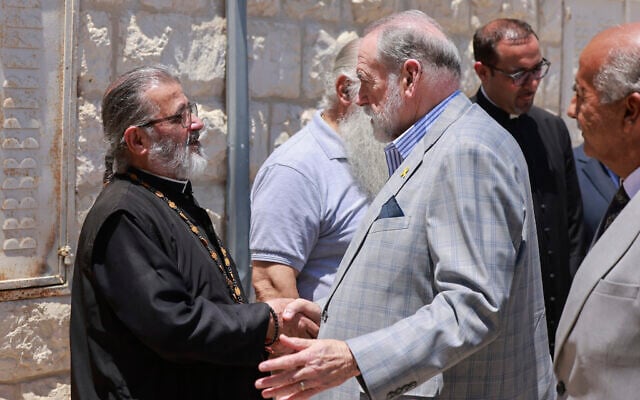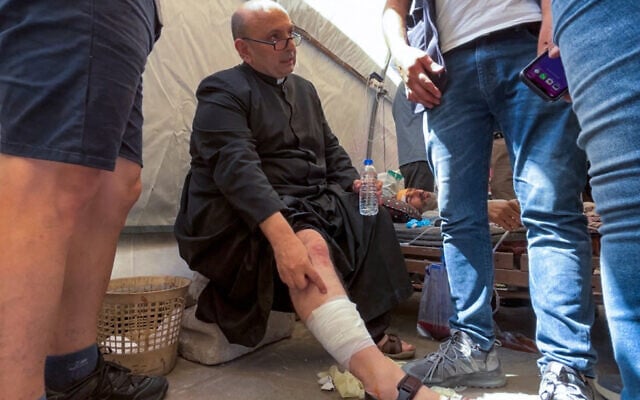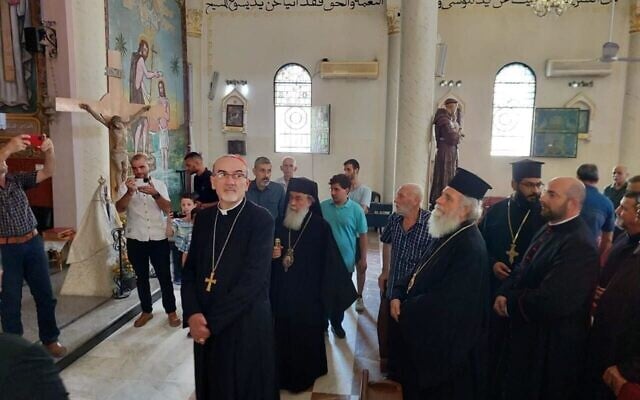



Israel has had an atrocious week with regard to its relations with the Christian world.
US Ambassador to Israel Mike Huckabee, an outspoken and dedicated Christian supporter of the Jewish state, fired off a seething letter to Interior Minister Moshe Arbel last Wednesday, threatening to publicly announce that Israel no longer welcomes Christian groups to Israel.
Israel “is instead engaging in harassment and negative treatment toward organizations with long-standing relationships and positive involvement toward Zionism and friendship to the Jewish people and the State of Israel,” the US envoy wrote in a missive that was leaked to Hebrew media, quite possibly by Huckabee’s office, the next day.
Huckabee also said he would encourage American Christians to reconsider any plans to visit Israel if visa issues were not resolved, and that he would take reciprocal action against Israelis seeking visas to the US.
The ambassador didn’t stop there.
On Saturday, Huckabee — who is also a Baptist minister — visited the Christian Palestinian town of Taybeh in the West Bank, the scene of repeated attacks by settlers. In one such incident last week, some set fire to the fields around the ruins of the historic Church of St. George and a nearby cemetery.
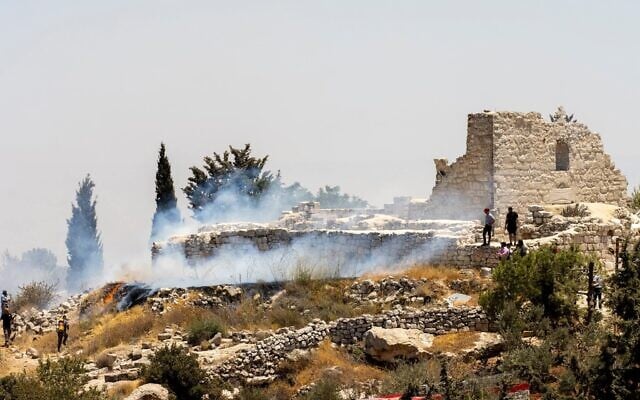
During the attack, local church leaders called the police emergency line twice and were told that a police force was being dispatched, but they said that no police officers arrived at the scene.
Huckabee did not try to mask his anger in Taybeh either.
“Desecrating a church, mosque or synagogue is a crime against humanity and God,” Huckabee wrote on X.
“I work for ALL American citizens who live in Israel — Jewish, Muslim or Christian. When they are terrorized or victims of crime I will demand those responsible be held accountable with real consequences,” he added.
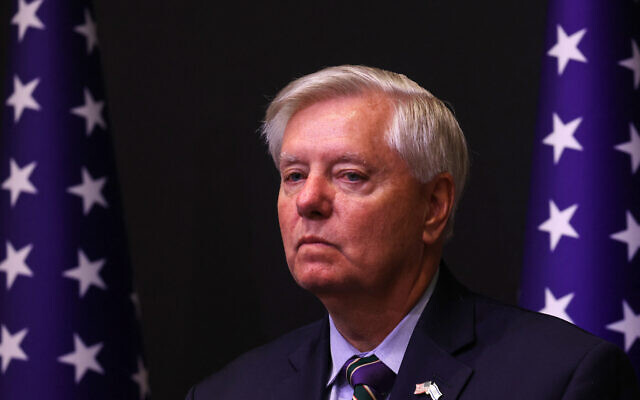
Another unabashed Christian Zionist, Sen. Lindsey Graham, also raged against the incident. “What’s happening in the West Bank bothers the hell out of me,” he told Fox News. “I want to find out who did it, and I want them to be punished. And if it was settlers from the West Bank, I want them to be punished.”
Those were not even the most severe incidents last week. On Thursday, an Israeli tank shell hit Gaza’s only Catholic church, killing three people. Father Gabriel Romanelli, the church’s priest whom former pope Francis used to speak to daily, was injured in the attack.
Condemnation poured in from around the world, including from Pope Leo XIV and Italian Prime Minister Giorgia Meloni. US President Donald Trump berated Prime Minister Benjamin Netanyahu and demanded he issue a statement of regret.
The three incidents — which followed years of harassment of Christians in Jerusalem and vandalism of sites by Jewish extremists — come at a time of growing international condemnation of Israel and rising antisemitism, when Israel should be embracing its friends.
Instead, Israel continues to allow citizens to violate the country’s principles while causing irreparable damage to its image and standing.
What’s worse is that all of the recent events could have been prevented. Instead, Netanyahu and his government are afraid to assert their authority, allowing extremists and those who have no understanding of the importance of Israel’s ties with Christians to set the agenda and inflict strategic damage on the Jewish state.
Beyond the vital moral imperative of protecting religious minorities and their holy sites, Israel’s global standing depends on its relations with the Christian world.
The vast majority of the Zionists in the world are Christian. Israel’s closest allies are majority-Christian or officially Christian countries, and the world’s largest Christian denominations have many of their holiest sites in Israel.
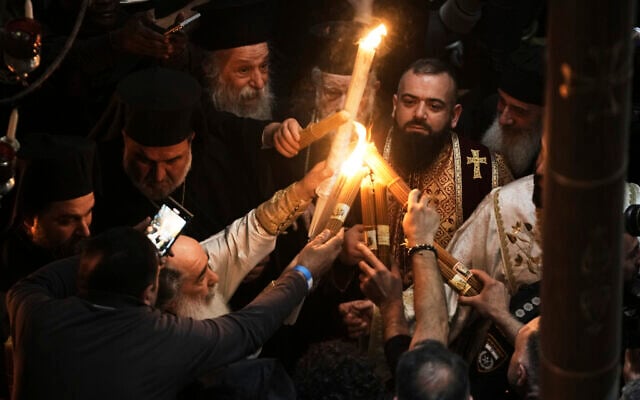
Close regional partners like Greece, Cyprus, and Moldova are overwhelmingly Orthodox Christian, as is Russia, a world power with which Israel has deep but complex security and economic ties. Half of Palestinian Christians and a significant minority of those in Israel are Orthodox, and what happens to them resonates with the 260 million believers around the world.
The Catholic Church has 1.4 billion adherents across the globe who listen closely to what the pope says. Leading European countries like Italy, France, and Spain treat the welfare of the Catholic community and protection of Christian sites in Israel as core elements of their bilateral relationship with Israel.
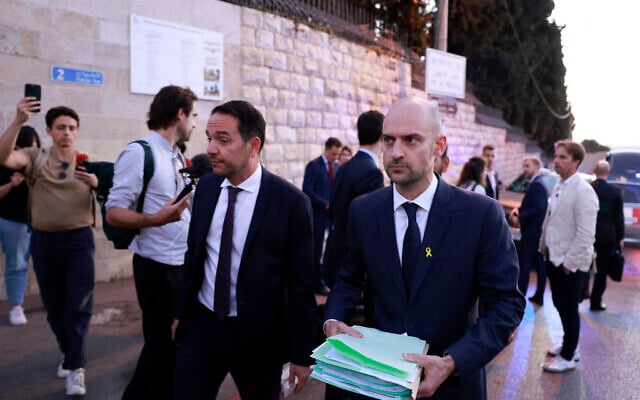
For example, visits from senior French officials are repeatedly overshadowed by fights over privileges at their four holy sites in and around Jerusalem. In November, French Foreign Minister Jean-Noel Barrot visited Israel to discuss potential ceasefire deals in Gaza and Lebanon, but his trip was dominated by a diplomatic row sparked by Israeli police officers arresting two guards at a French-owned church in Jerusalem.
Israel’s relations with these powerful and hierarchical churches are complex and occasionally adversarial, but it enjoys enthusiastic and dedicated support from another massive Christian group — evangelical Protestants.
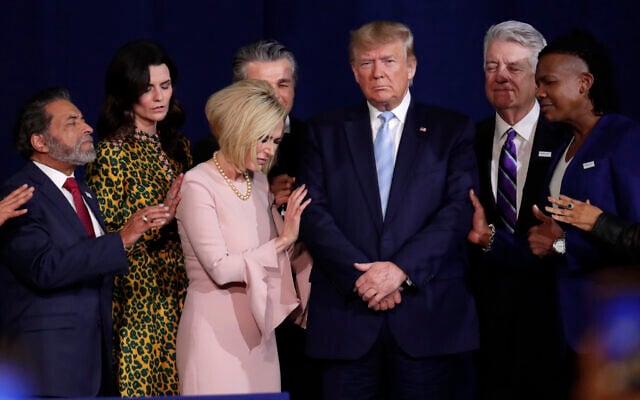
Up to 100 million Americans identify as evangelicals, bringing funding and their significant political clout to the Jewish state. The largest Christian Zionist organization, Christians United for Israel, has more members than there are Jews in the US. They lobby elected officials, stage rallies and prayer events, send money, and come to Israel on pilgrimage and solidarity visits, even during war.
Trump said he moved the capital of Israel to Jerusalem in 2017 ‘for the evangelicals’
They also represent the largest constituency in Trump’s coalition. He said he moved the capital of Israel to Jerusalem in 2017 “for the evangelicals,” and complained that “the evangelicals are more excited about that than Jewish people.”
As significant as the US community is, the majority of Christian Zionists live in the global south, in countries like Brazil, South Africa, Nigeria, and even China.
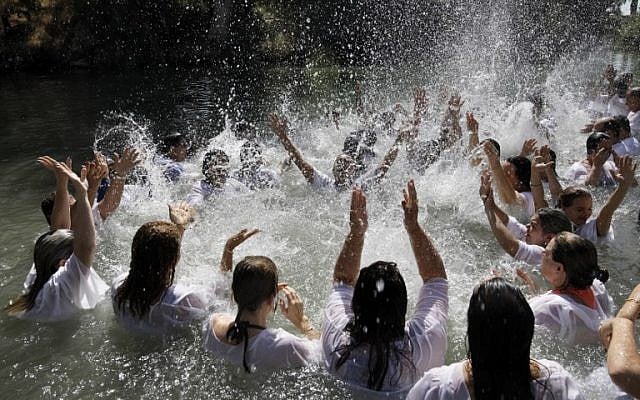
Christian Zionists are motivated by three things, said Bishop Robert Stearns, founder of Eagles’ Wings Ministries: a “debt of eternal gratitude” to the Jewish people for being the foundation of Christianity’s stories, worldview, and inspiration; a “debt of eternal repentance” for the atrocities committed against Jews under the banner of Christianity; and a common threat from “an unholy alliance” of far-left groups and a radical vision of Islam.
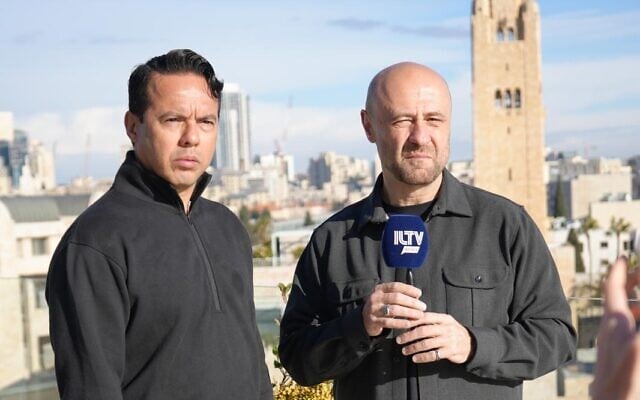
One of the Christian Zionist organizations mentioned in Huckabee’s letter is the International Christian Embassy in Jerusalem.
With a presence in 180 countries, ICEJ has been the driving force behind the pro-Israel turn of small countries in Central America and in the Pacific.
An American nuclear scientist, Victor Schlatter, moved to the highlands in Papua New Guinea with his wife Elsie in the 1950s to translate the Bible into local languages. He also established a network of over 100 churches that preach support for Israel. The ICEJ representatives to the Pacific region since the 1980s, the Schlatters have brought thousands of pilgrims to Israel for the annual Feast of Tabernacles celebrations on the Sukkot holiday.
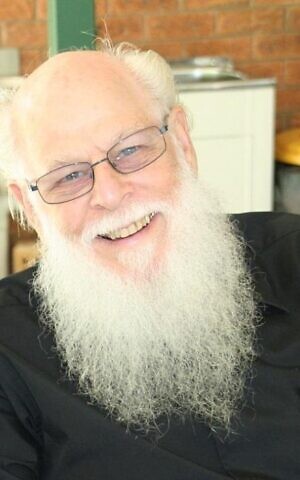
Papua New Guinea moved its embassy to Jerusalem in 2023, and Fiji is moving its embassy in November, both thanks to ICEJ. The group was also instrumental in Guatemala’s move.
ICEJ Vice President David Parsons co-wrote the original draft of the 1995 Jerusalem Embassy Act that recognized Jerusalem as Israel’s capital and called for the embassy to be moved from Tel Aviv to Jerusalem.
The organization has helped nearly 200,000 Jews make aliyah, said Parsons, and has built around 500 bomb shelters in Israel over the past decade.
Christian groups have redoubled their efforts since the October 7, 2023, Hamas invasion and massacre in southern Israel.
One of the few feel-good stories in the immediate aftermath of the Hamas slaughter was a group of cowboys who came to volunteer on Israeli farms through HaYovel, a Christian Zionist organization based out of the central West Bank settlement of Har Bracha. The cowboys’ organization was just one of dozens of Christian groups who made their way to Israel in the first months of the war, volunteering in the fields, visiting massacre sites, and donating millions of dollars to devastated communities and displaced families.

Despite the passionate support, evangelical Christians have also been the target of harassment in recent years. In May 2023, hundreds of religious Jews, led by Jerusalem Deputy Mayor Aryeh King, protested angrily near the Western Wall as Christians taking part in a 21-day fast and prayer gathering arrived on its final day.
In a subsequent Hebrew-language Maariv article, ICEJ president Juergen Buehler described the events as unprecedented. “It was one of the few times in Israel where I feared an assault. I’d never experienced such hostility before,” said Buehler, a German-born ordained minister and physicist who has been living in Israel since 1994, and whose two sons served in IDF combat units.
The vitriol in May “was directed at people who spent a lot of money on a trip to Israel and it was a very bad experience for them in the Holy Land,” said Buehler.
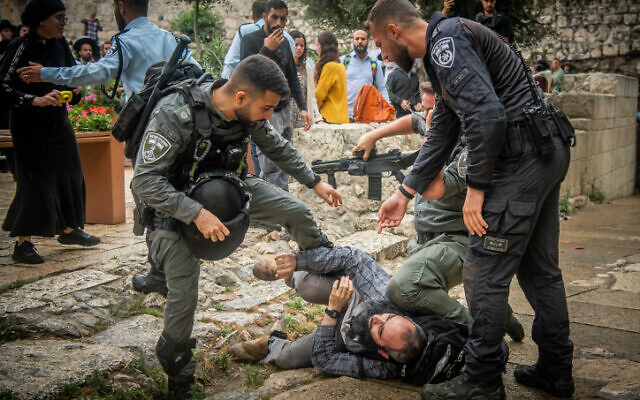
The protest was not an isolated event. It followed a series of incidents, including dozens of cases of mostly young Orthodox Jews spitting on the ground in front of clergy and other Christians, mainly in Jerusalem’s Old City, an act that may be prosecuted as a hate crime. There were also acts of vandalism against churches and cemeteries, and physical assaults.
Last year alone, there were 111 reported cases of attacks against Christians, according to the Rossing Center for Education and Dialogue.
The series of incidents does not at all mean that mainstream Israelis and top officials are hostile to Christians and their support for Israel.
No prime minister has been closer to evangelicals than Netanyahu, whose return to office in 2009 coincided with the growing political power of evangelicals and the emergence of Israel support as a foundation of their theology and policy.
Top Netanyahu aide and Strategic Affairs Minister Ron Dermer said at a 2021 conference that Israel should prioritize the “passionate and unequivocal” support of evangelical Christians over that of American Jews. “People have to understand that the backbone of Israel’s support in the United States is the evangelical Christians,” he declared.
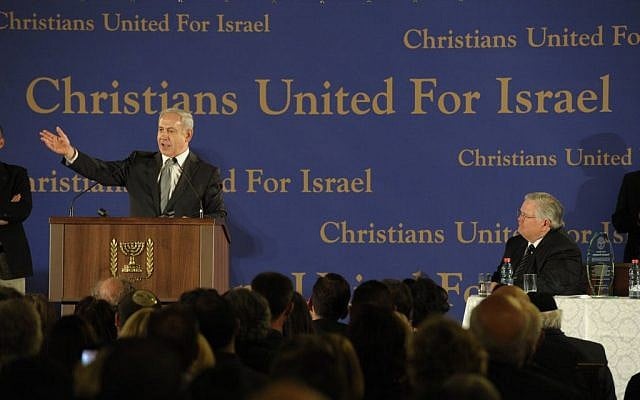
There has also been condemnation by senior Israeli officials and rabbis of the harassment of Christians.
“We take bullying, violence and acts of hate and vandalism of any kind seriously,” Israel Police told The Times of Israel last year. “Accordingly, any report or complaint received by the police about an attempt to harm religious figures, religious sentiments or holy places is examined and treated professionally and thoroughly with the tools that we have.”
The police condemned the “despicable behavior of any child, youth or adult who harms or tries to harm Christians.”
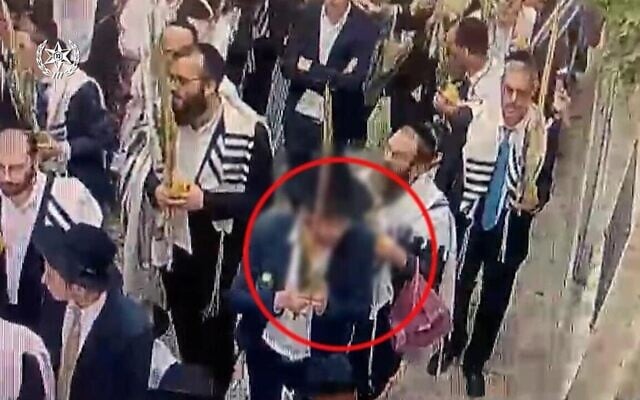
The Foreign Ministry told The Times of Israel in the aftermath of the Rossing Center report that while there is “certainly room for improvement,” all of Israel’s senior leadership — including the chief rabbis — have made clear and public statements against attacks on Christians, and reaffirmed their right to live and worship in safety.
“I think the prime minister and others with a broader worldview certainly do [recognize the importance of Christian Zionists], most definitely,” said the ICEJ’s Parsons.
The senior decision-makers aren’t the problem. It’s their unwillingess to impose Israel’s laws and values on radical outliers — often for political reasons — and a failure to prioritize Israel’s relationship with the diverse elements of the Christian world
Netanyahu’s office intervened on Sunday to successfully resolve the visa issue, Calev Myers, a lawyer who represents Christians in Israel, told The Times of Israel.
Huckabee also thanked Netanyahu in a statement announcing that the issue was “fully resolved.”
The senior decision-makers aren’t the problem per se. Rather, it is their unwillingness to impose Israel’s laws and values on radical outliers — often for political reasons — and a failure to prioritize Israel’s relationship with the diverse elements of the Christian world.
Parsons blamed the visa fight on “mid-level bureaucrats in the Interior Ministry, whose worldviews are a lot smaller.”
The ultra-Orthodox Shas party insists on control of the powerful Interior Ministry in its coalition agreements, giving it influence over local government and enabling it to determine who is recognized as a Jew in the country. It packs the ministry with loyalists, many of whom either see Christians as missionaries to be combated or, at best, don’t recognize the importance of Christian support for Israel.
One such Shas-appointed bureaucrat was the source of the visa problems for Christian groups, a leader of one of the organizations told The Times of Israel: “It comes down to one official, the head of the visa section in the Ministry of Interior. She’s been very deliberate and intentional every time she deals with this.”
Huckabee indicated that mid-level functionaries were to blame in his announcement that the visa issue was resolved: “I’m convinced the Interior Minister was not fully aware of the change being imposed.”
The Interior Ministry did not respond to requests for comment.
The settler violence in the West Bank and spitting attacks against Christians in the Old City violate Israeli law, and police say they are working to apprehend any attackers. Yet the phenomena persist, an indication that somewhere up the chain of command, the issue is simply not being prioritized.
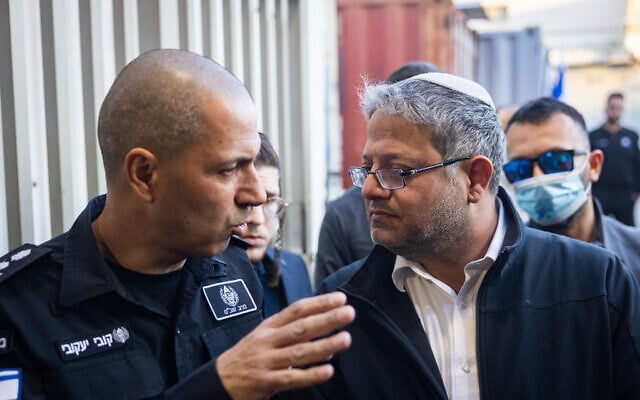
Some say that far-right National Security Minister Itamar Ben Gvir is the problem. He has been accused by Attorney General Gali Baharav-Miara, legal experts, and other critics of using his authority in a manner that constitutes “illegitimate intervention” in the force, using the possibility of a promotion as a carrot-and-stick to influence cops’ decision-making.
In December, a senior officer in the Israel Police’s West Bank division was arrested on suspicion of turning a blind eye to information about extremist settler violence in order to win promotion from Ben Gvir.
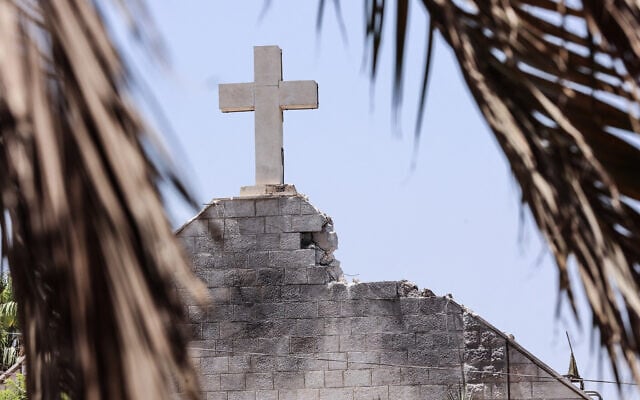
The IDF has said that the tank shelling of the Gaza church was a mistake, and that it makes every effort to avoid harm to civilians and religious sites. It is hard to imagine the Israeli army intentionally targeting the church.
Yet that does not let Israeli leaders and commanders off the hook. If the military decides it must avoid hitting something at all costs, it has plenty of tools to ensure that troops do not fire in that direction. The IDF has been very careful about avoiding any strikes that have even a small chance of hitting areas where Israeli hostages might be.
If it recognized the sensitivity of the church, the fact that hundreds of civilians shelter there, and the resonance of the site for Christians around the world, the IDF would have ordered troops to avoid firing anywhere near the site.
And if the army was too focused on the tactical fight against terrorists to think about the strategic implications of the church, then the veteran political leaders should have given clear instructions to Israel’s military chiefs.

The problem boils down to a willingness by Netanyahu and his government to allow citizens and officials to carve out little fiefdoms where Israel’s rule of law and strategic sense do not reach.
Out of a fear of crossing its far-right partners, the government has failed to stop extremists in the West Bank attacking and even murdering Palestinians in the West Bank. It could even more easily put an end to harassment of Christians in the Old City, but it has not made the issue a priority.
Bureaucrats are able to make life difficult for passionate Zionists looking to come to Israel to pray and show solidarity with the Jewish state, leading to drastic threats from even Israel’s closest friends.
And troops on the ground in Gaza, as they focus on the complex fight against dangerous terrorists, have not been given clear instructions about key sites of strategic and moral importance.
When problems do arise — like the Huckabee letter, a 2023 anti-missionary bill, or the three-day closure of the Church of the Holy Sepulcher in 2018 to protest new tax measures — Netanyahu and his top aides scramble to work out solutions after damage has already been done.
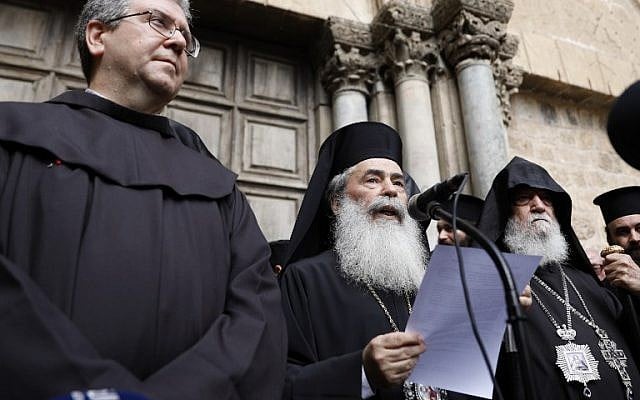
“Personnel is policy” was a slogan associated with Ronald Reagan’s White House. The aphorism applies in Jerusalem as well. Netanyahu has not created a post for an adviser on Christian affairs, and as a result, the issue falls by the wayside as tactical battlefield considerations, coalition politics, and the needs of other constituencies take precedence.
Christian groups and communities in Israel say they don’t have an address in the Israeli government to approach with their concerns
Without an influential senior official handling the file, there is no one to recognize potential issues before they spill out into the public, or to solve problems before they become diplomatic and PR disasters.
What’s more, Christian groups and communities in Israel say they do not have an address in the Israeli government to approach with their concerns. The Prime Minister’s Office, Foreign Ministry, Interior Ministry, Religious Affairs Ministry, Israel Police, and Jerusalem Municipality all play important roles, but none has the authority to handle the issue in its entirety.
While the visa quarrel is resolved, many of the ongoing issues remain unsolved.
And with a government that refuses to ensure that extremists in government and in society do not endanger Christians and Israel’s relationships with them, more crises are sure to emerge in the future.

